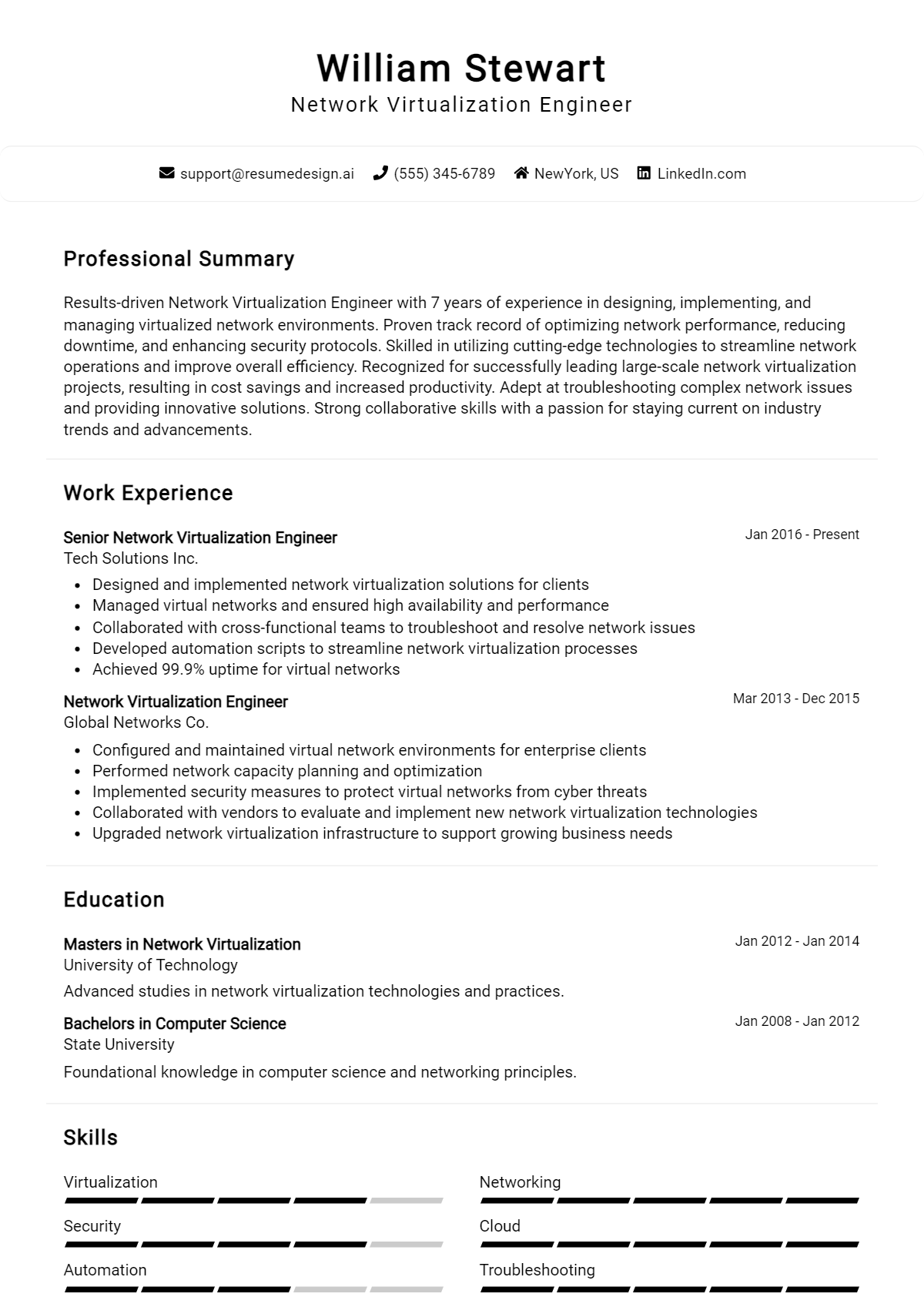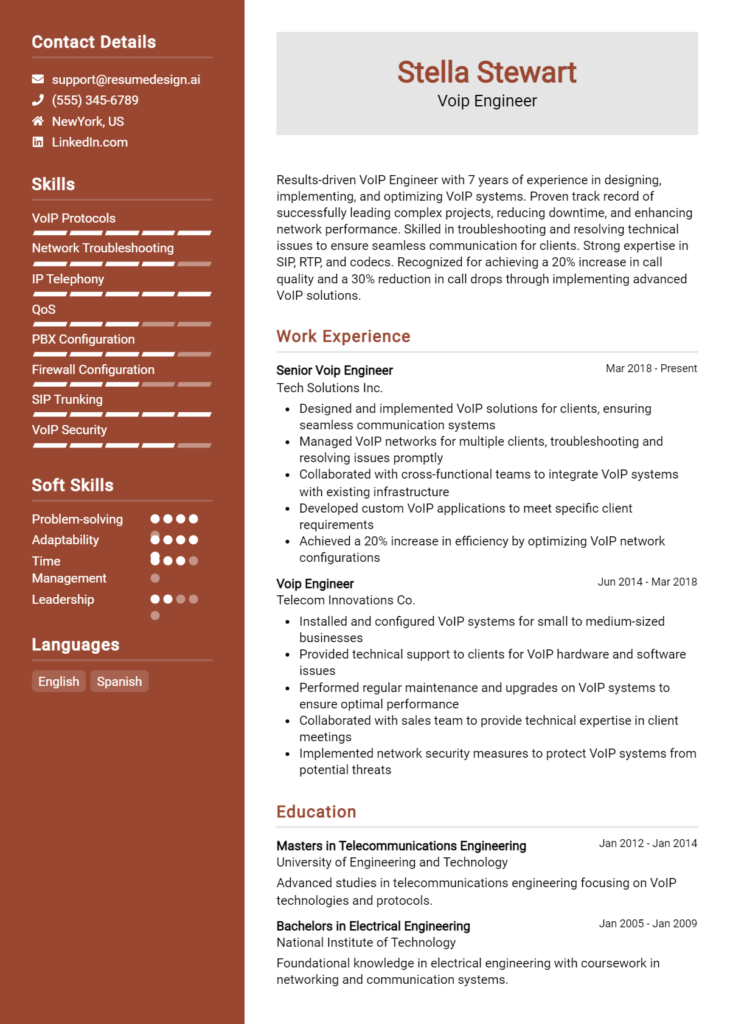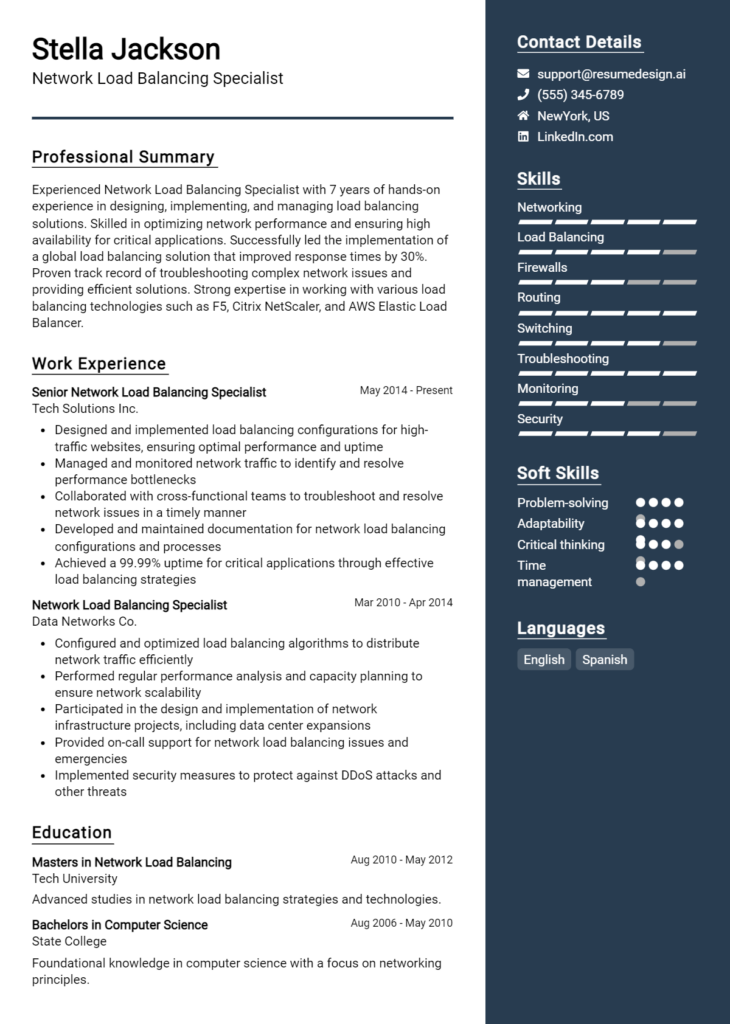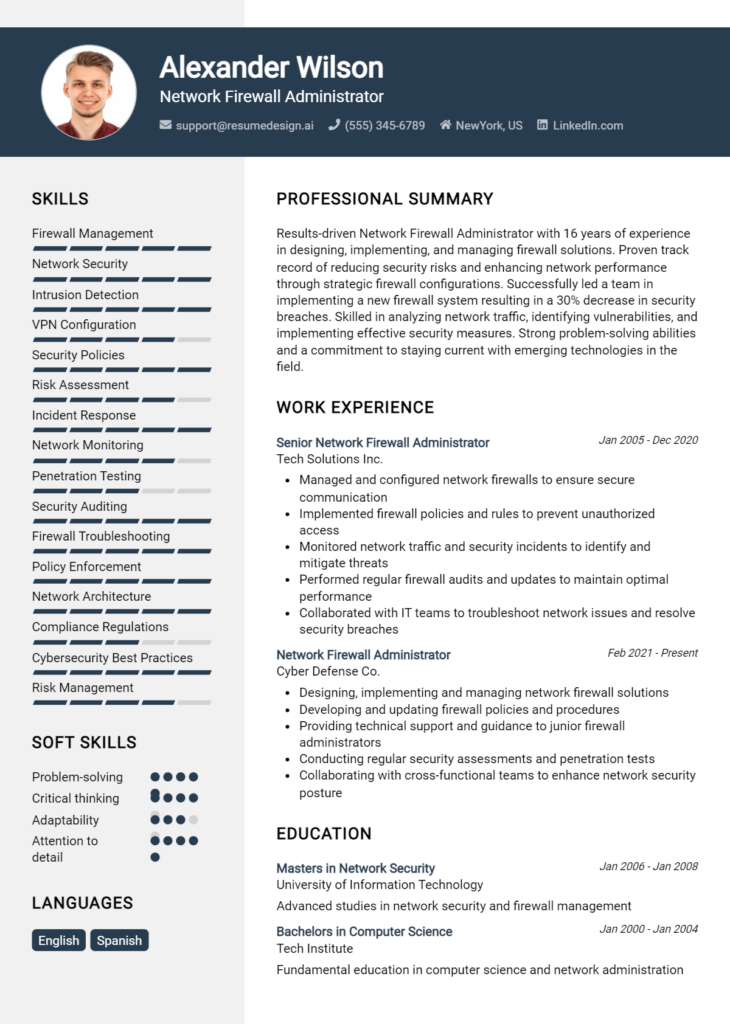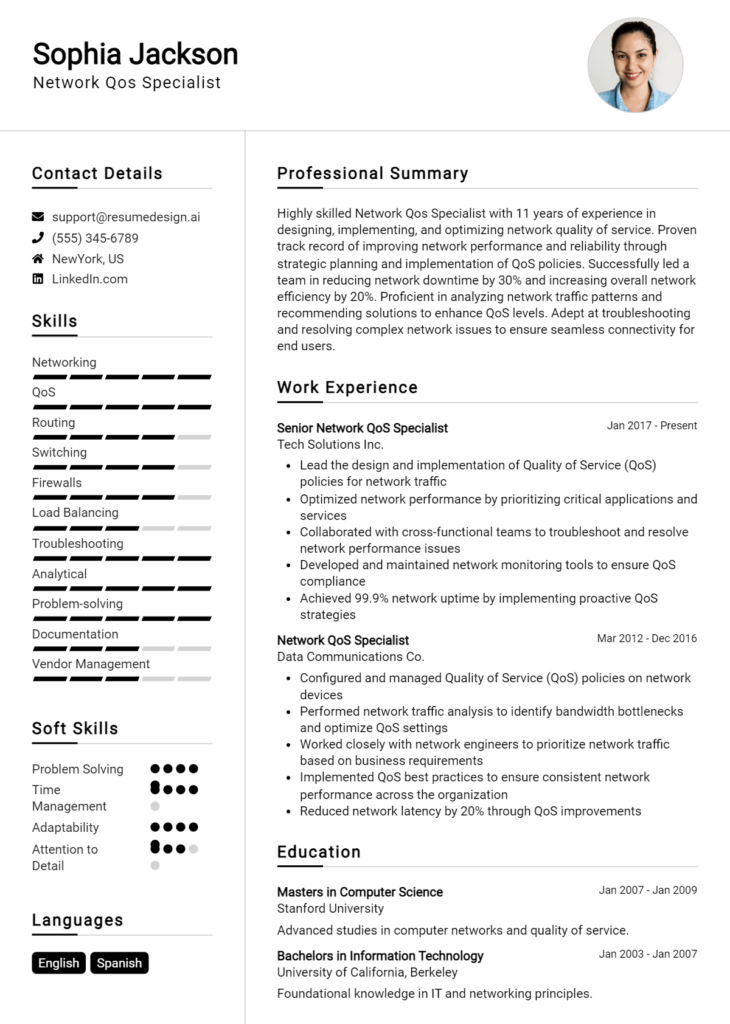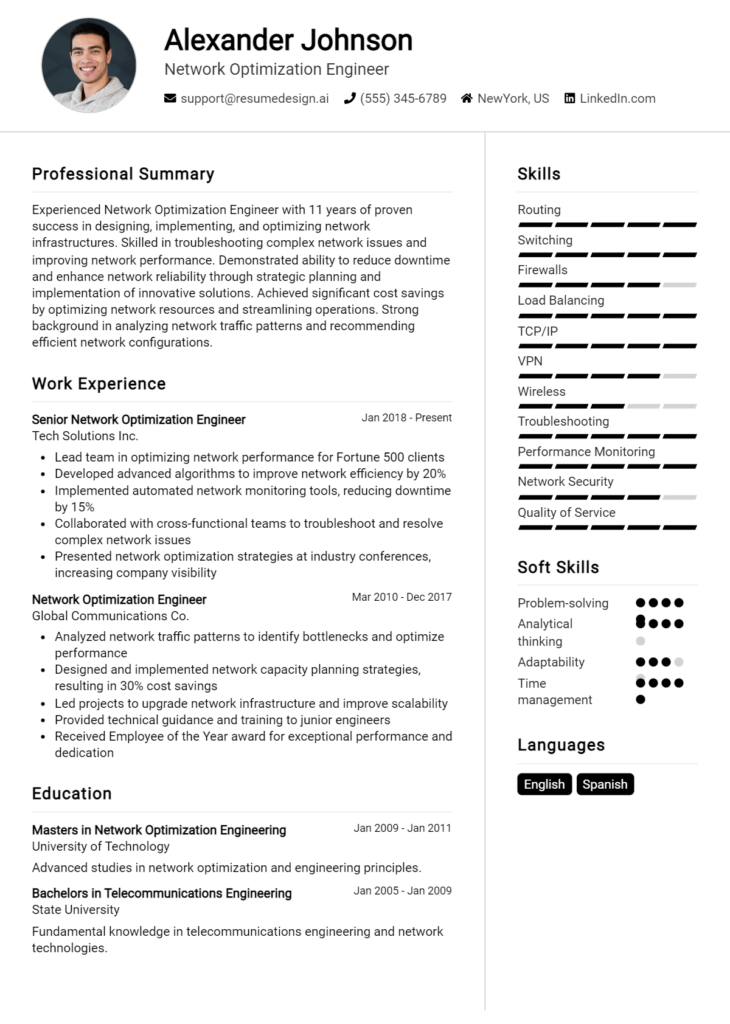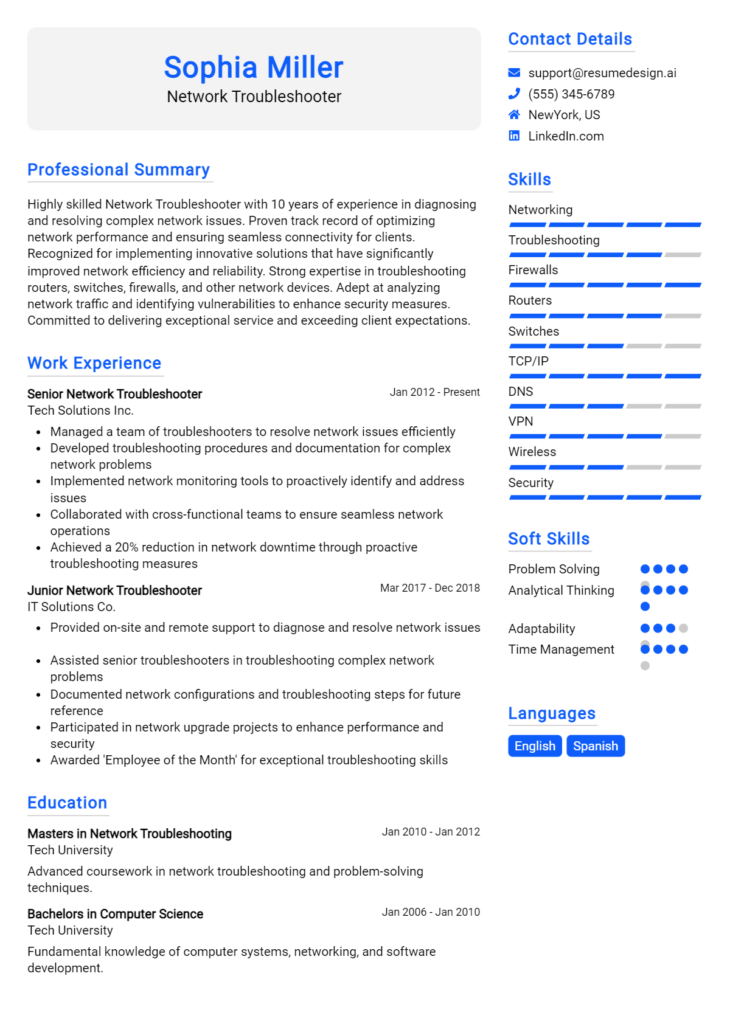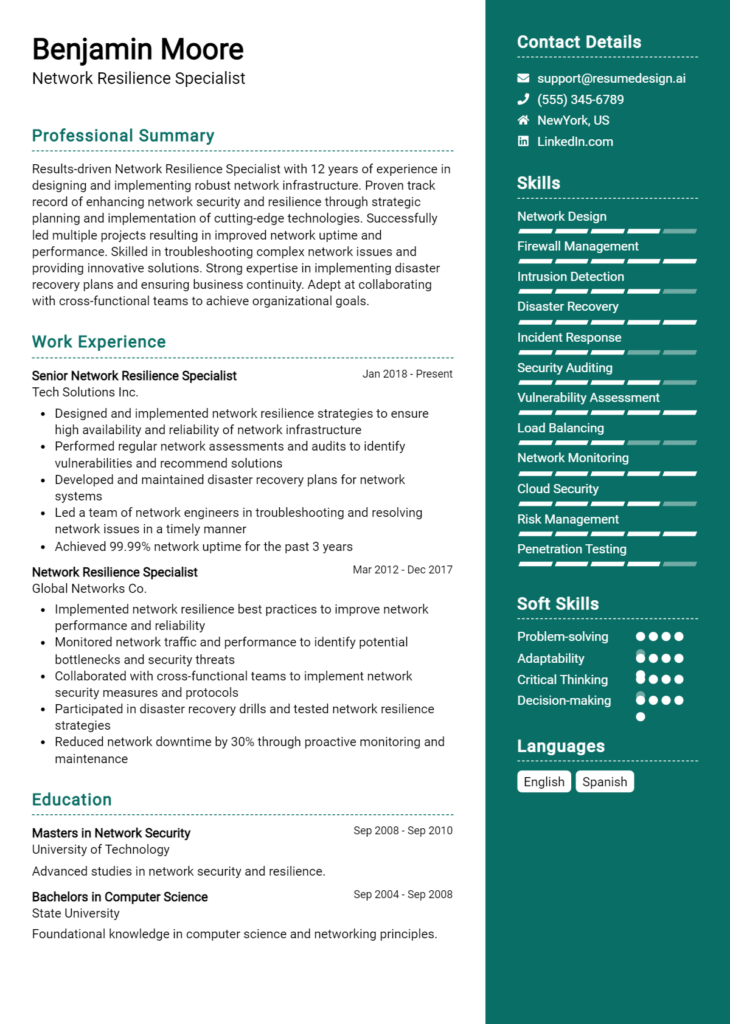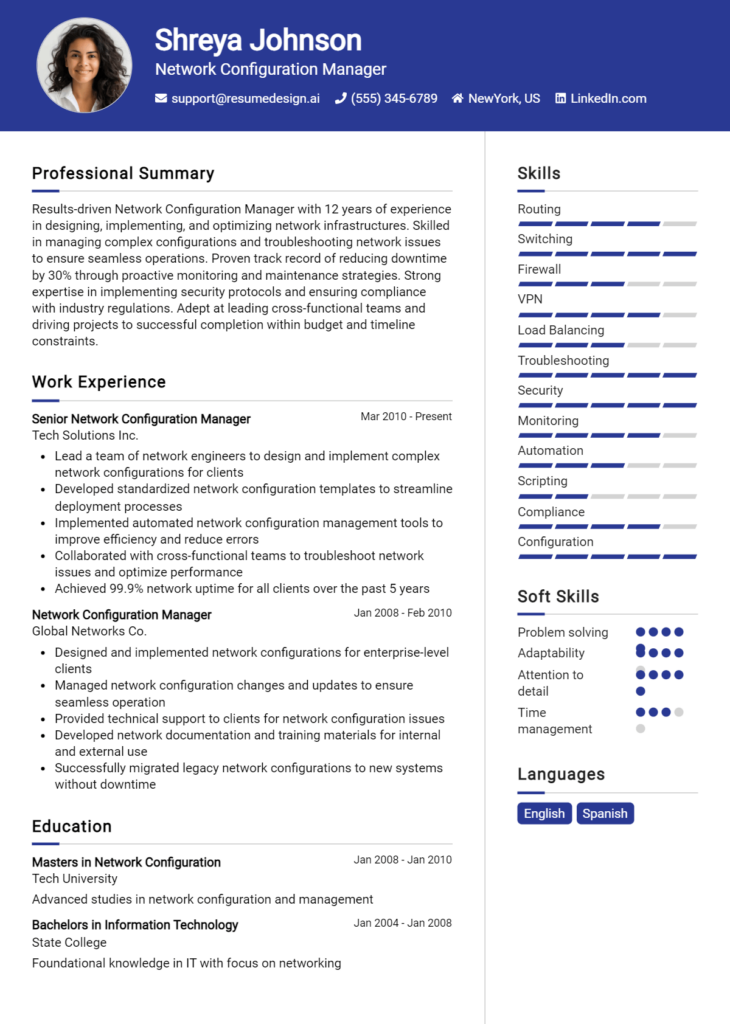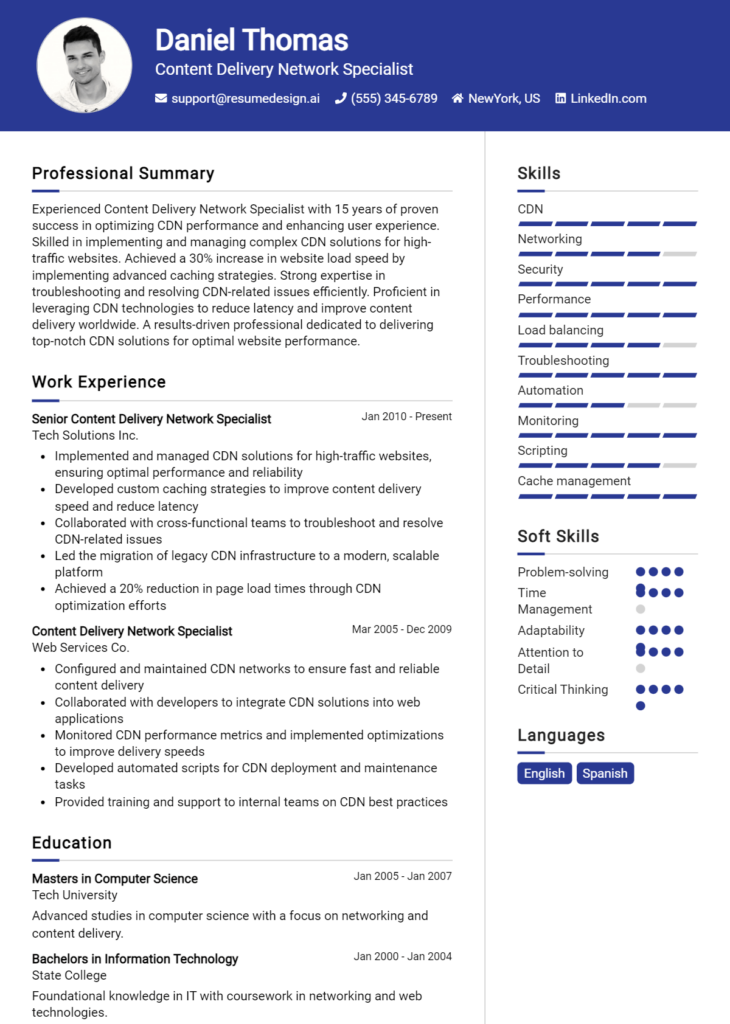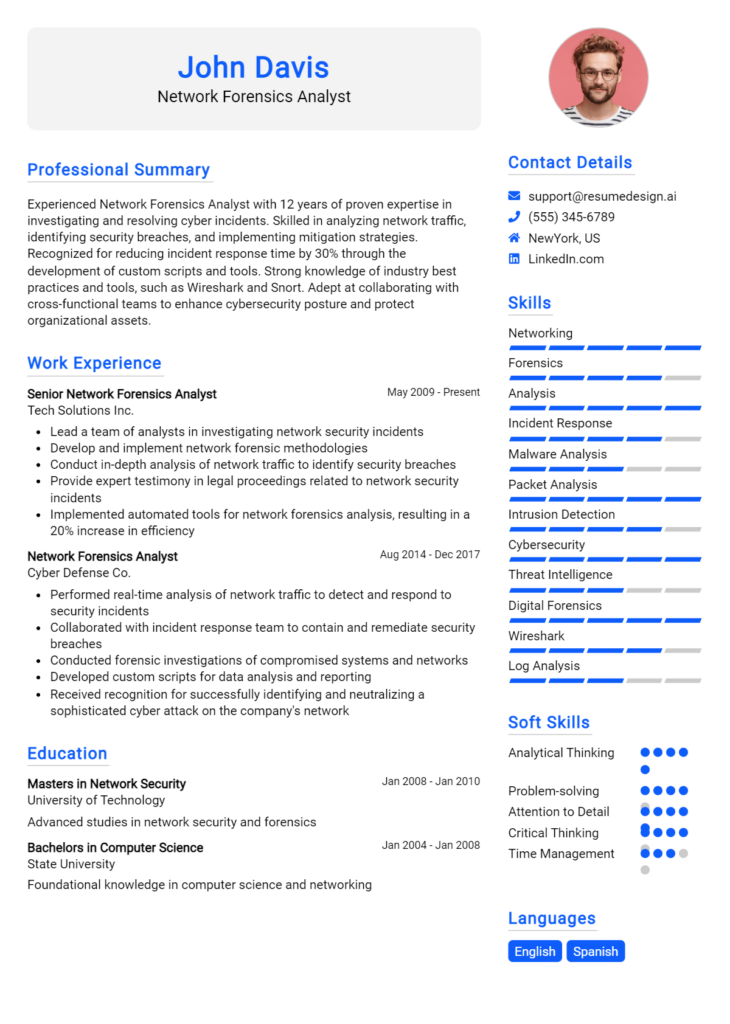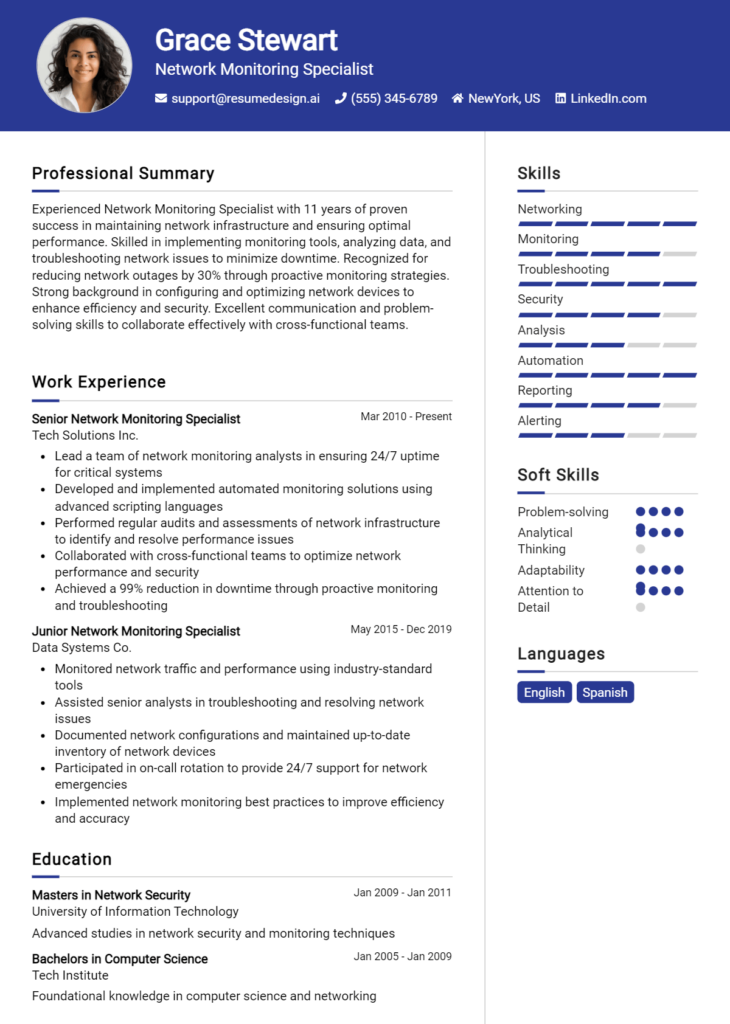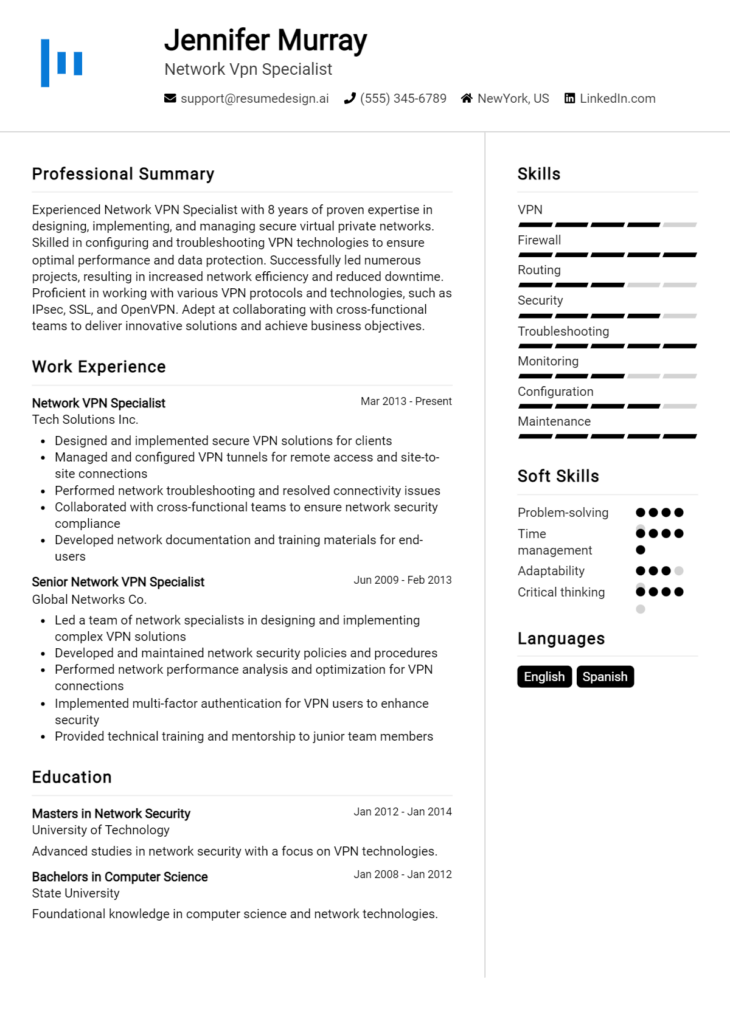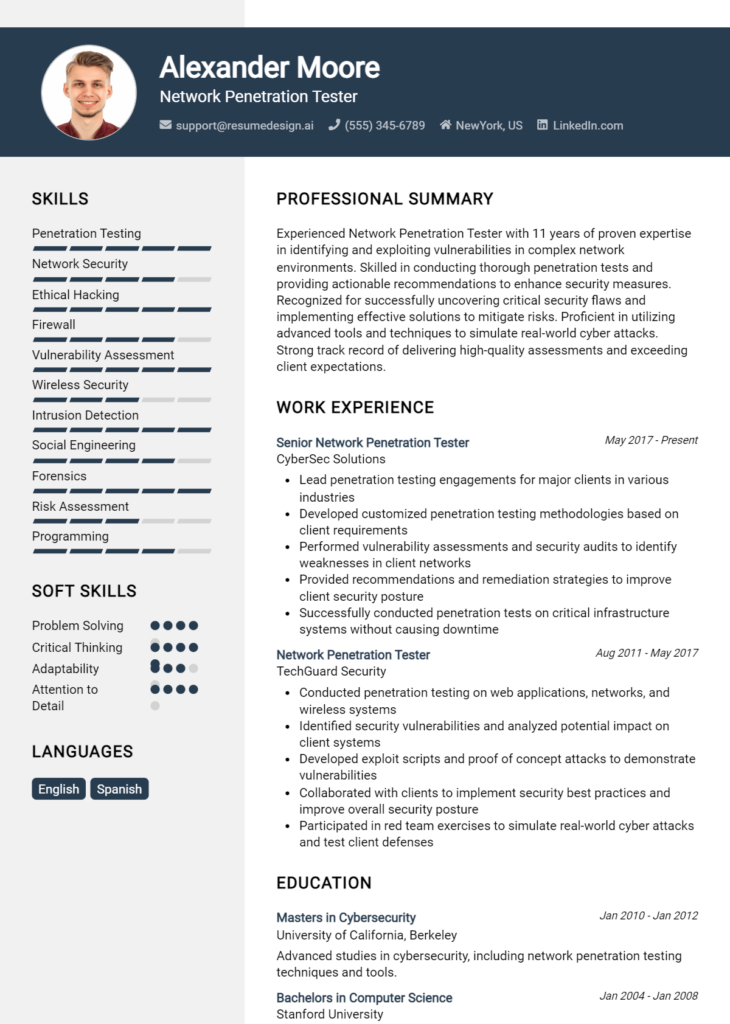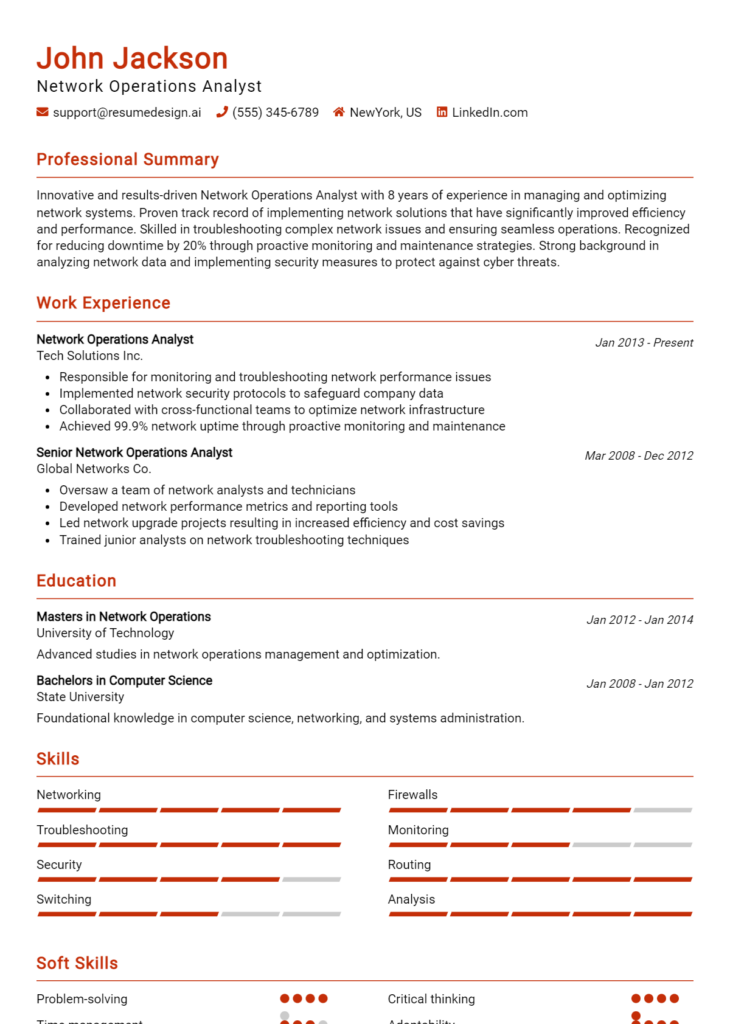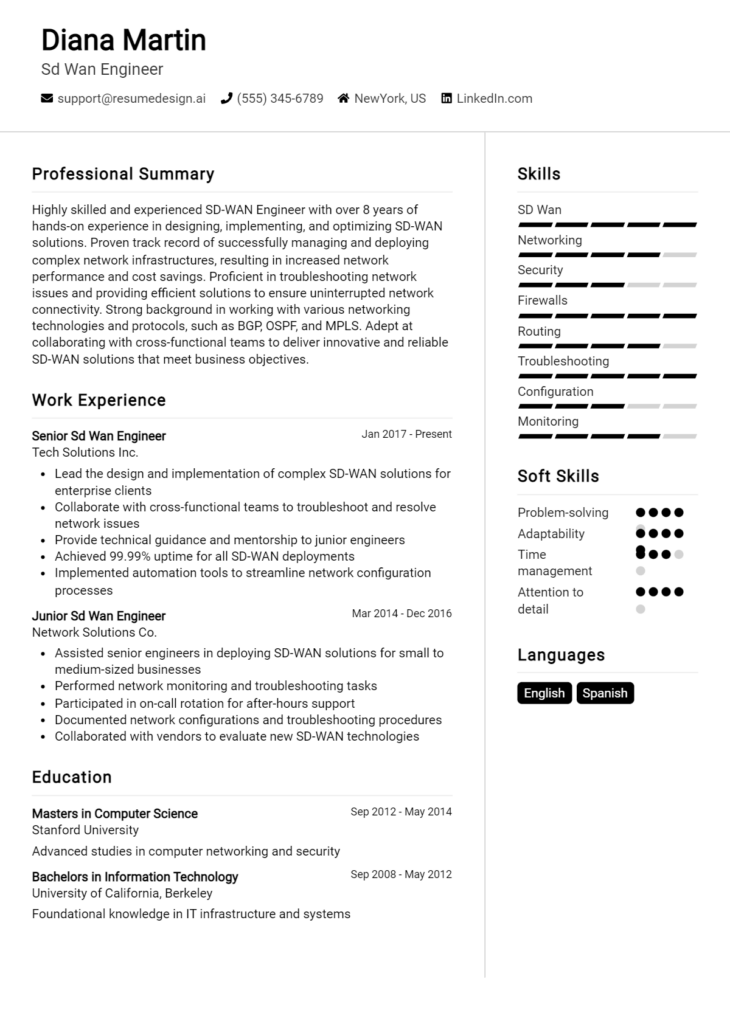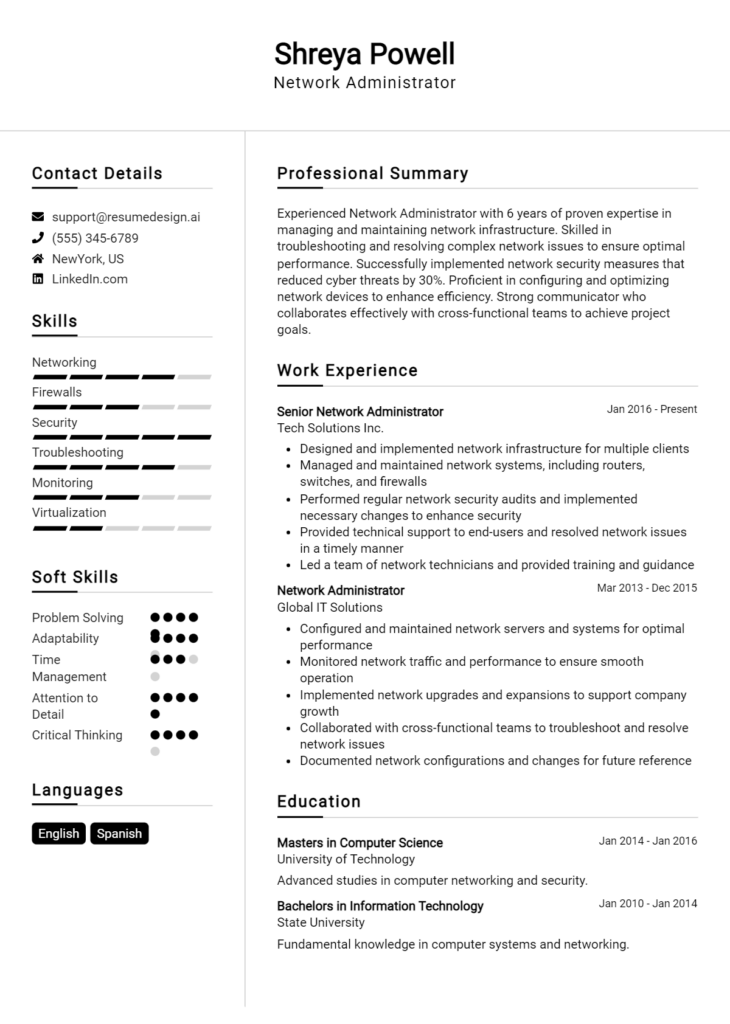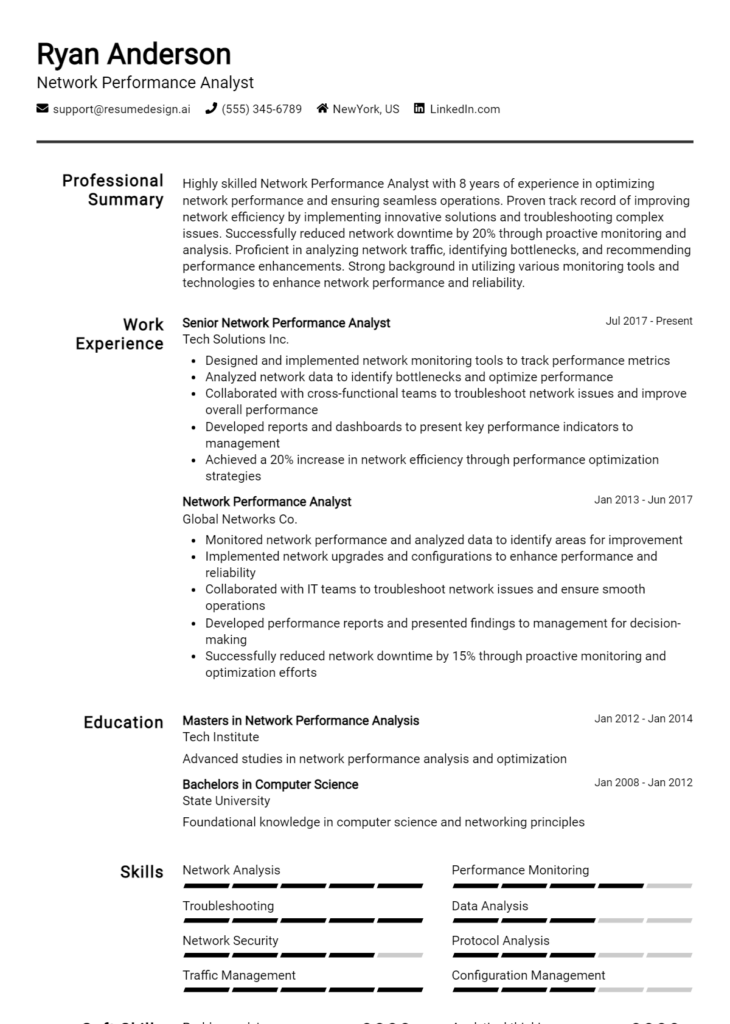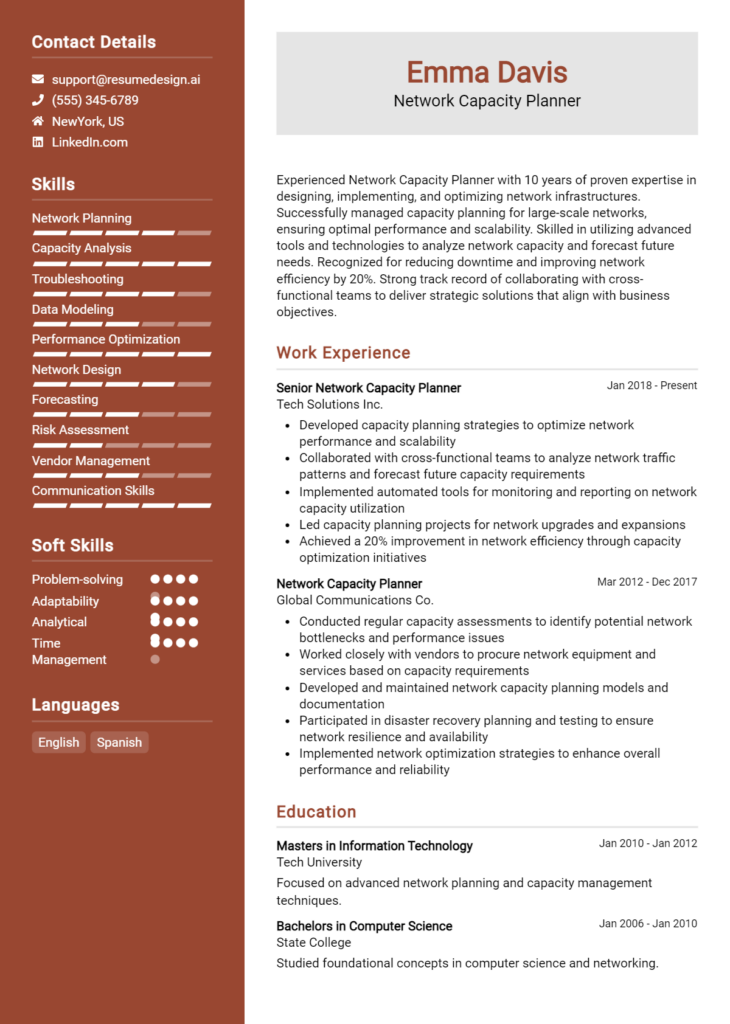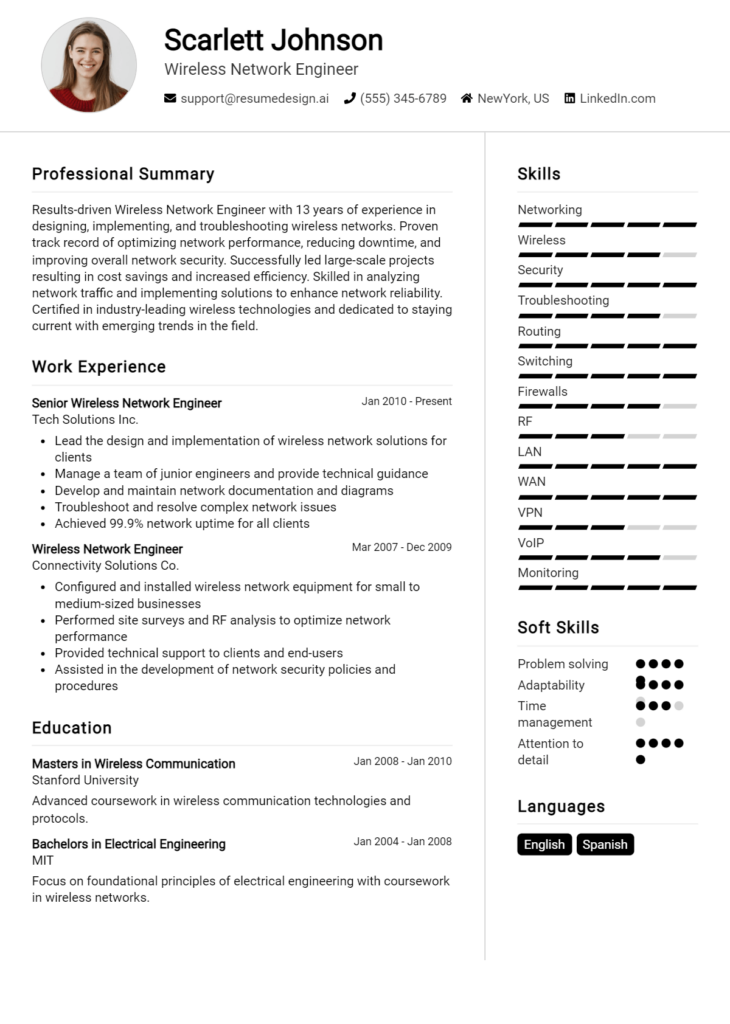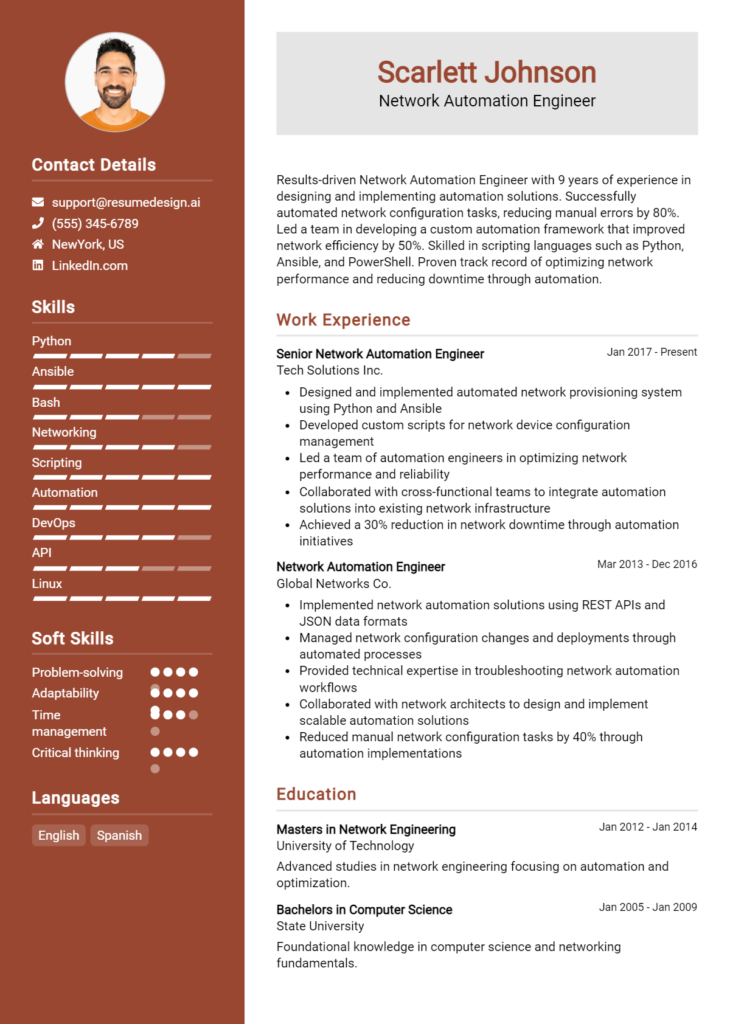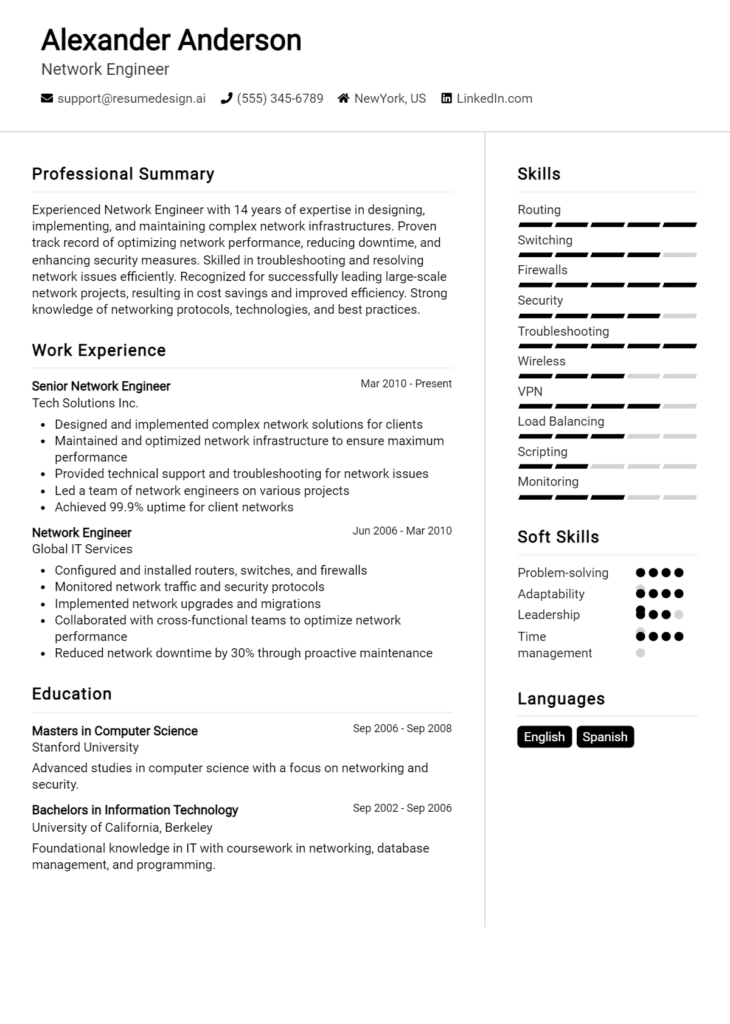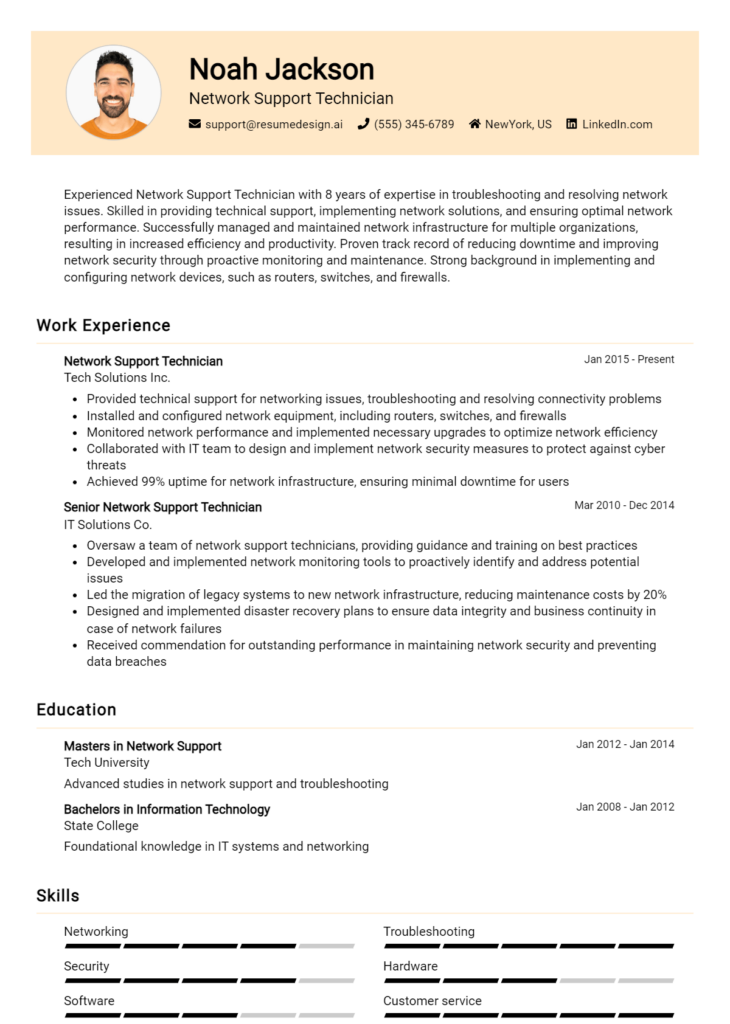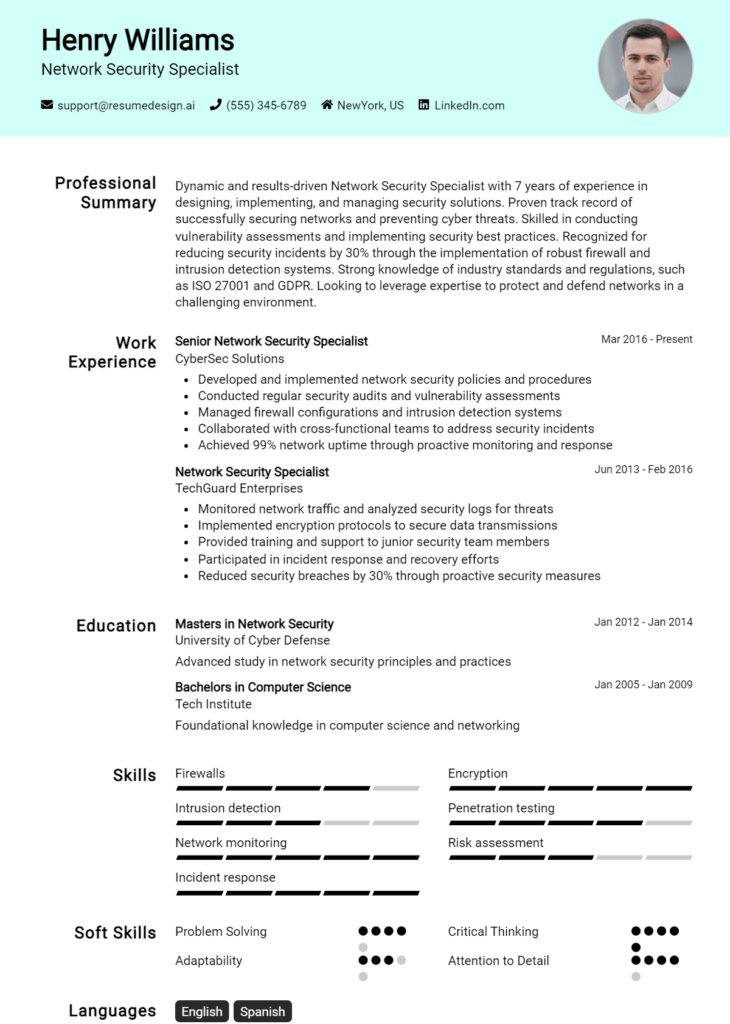Network Virtualization Engineer Core Responsibilities
A Network Virtualization Engineer is responsible for designing, implementing, and managing virtualized network environments, ensuring seamless connectivity and performance across various departments. This role requires a blend of technical expertise in virtualization technologies, operational efficiency, and strong problem-solving skills. By collaborating with IT, development, and operations teams, the engineer aligns network solutions with organizational goals. A well-structured resume that highlights these competencies can effectively showcase a candidate's ability to drive innovation and efficiency within the organization.
Common Responsibilities Listed on Network Virtualization Engineer Resume
- Design and implement network virtualization solutions.
- Manage and optimize virtualized network infrastructures.
- Troubleshoot and resolve network performance issues.
- Collaborate with cross-functional teams for integration projects.
- Develop and maintain network documentation and diagrams.
- Monitor network traffic and performance metrics.
- Ensure security protocols and compliance standards are met.
- Evaluate and recommend new networking technologies.
- Assist in disaster recovery planning and execution.
- Provide technical support and training to team members.
- Stay updated on industry trends and best practices.
- Participate in capacity planning and resource allocation.
High-Level Resume Tips for Network Virtualization Engineer Professionals
In the competitive field of network virtualization engineering, a well-crafted resume is not just a document; it's your personal marketing tool that introduces you to potential employers. Often the first impression you make, your resume needs to effectively convey your unique skills and impressive achievements to stand out in a crowded job market. As a Network Virtualization Engineer, it's essential that your resume reflects your technical expertise and practical experience in a clear and compelling manner. This guide will provide practical and actionable resume tips specifically tailored for Network Virtualization Engineer professionals, helping you to present your qualifications in the best light possible.
Top Resume Tips for Network Virtualization Engineer Professionals
- Tailor your resume to align with the job description, incorporating keywords and phrases that reflect the specific requirements of the role.
- Highlight relevant experience in network virtualization projects, detailing your contributions and the technologies used.
- Quantify your achievements, using metrics wherever possible to demonstrate the impact of your work (e.g., improved network performance by X% or reduced downtime by Y hours).
- Showcase industry-specific skills such as SDN (Software-Defined Networking), NFV (Network Functions Virtualization), and cloud technologies.
- Include certifications relevant to network virtualization, such as Cisco Certified Network Professional (CCNP) or VMware Certified Professional (VCP).
- Utilize a clean and professional format that enhances readability and emphasizes key information.
- Incorporate a summary statement that captures your core competencies and overall career goals in network virtualization.
- Leverage project descriptions to illustrate your problem-solving abilities and technical proficiency.
- Keep your resume concise, ideally one to two pages, focusing on the most relevant experiences and skills.
- Regularly update your resume to reflect new skills, certifications, and experiences as the technology landscape evolves.
By implementing these tips, you can significantly enhance your resume's effectiveness, increasing your chances of landing a job in the Network Virtualization Engineer field. A polished and targeted resume not only showcases your qualifications but also demonstrates your commitment to your professional growth, making you a more attractive candidate to potential employers.
Why Resume Headlines & Titles are Important for Network Virtualization Engineer
In the competitive field of network virtualization engineering, a well-crafted resume headline or title is crucial for making a strong first impression. This brief phrase serves as a snapshot of a candidate's qualifications, allowing hiring managers to quickly assess the applicant's fit for the role. A powerful headline not only captures attention but also summarizes key skills and experiences relevant to the position. By being concise, relevant, and directly aligned with the job description, a strong headline can significantly enhance the chances of a resume standing out in a crowded applicant pool.
Best Practices for Crafting Resume Headlines for Network Virtualization Engineer
- Keep it concise: Aim for a headline that is no longer than 10 words.
- Be role-specific: Tailor the headline to reflect the specific position you are applying for.
- Highlight key skills: Include relevant technical skills or certifications that set you apart.
- Use impactful language: Choose strong action verbs and descriptive adjectives.
- Showcase experience level: Mention years of experience or specific achievements where possible.
- Incorporate industry keywords: Use terminology that aligns with the job description to pass through applicant tracking systems.
- Avoid jargon: Make sure your headline is easily understood by recruiters who may not have a technical background.
- Revise regularly: Adjust your headline for each application to ensure it aligns with the job description.
Example Resume Headlines for Network Virtualization Engineer
Strong Resume Headlines
Dynamic Network Virtualization Engineer with 5+ Years of Experience in SDN Solutions
Certified VMware Specialist Focused on Optimizing Network Performance
Expert in Cloud Network Virtualization and Infrastructure Design
Results-Driven Engineer with Proven Track Record in Network Automation
Weak Resume Headlines
Network Engineer
Experienced IT Professional
The strong headlines are effective because they clearly communicate the candidate's qualifications, experience, and specific area of expertise, making it easy for hiring managers to see their value at a glance. In contrast, the weak headlines fail to impress due to their vagueness and lack of detail; they do not provide any insight into the candidate’s unique skills or relevant experience, which can lead to missed opportunities in a competitive job market.
Writing an Exceptional Network Virtualization Engineer Resume Summary
A resume summary is a vital component for a Network Virtualization Engineer seeking to stand out in a competitive job market. It serves as a powerful introduction that quickly captures the attention of hiring managers by succinctly showcasing key skills, relevant experience, and notable accomplishments that align with the role. An exceptional summary is concise, impactful, and specifically tailored to the job description, ensuring that the candidate's qualifications are immediately apparent and compelling.
Best Practices for Writing a Network Virtualization Engineer Resume Summary
- Quantify achievements: Use numbers and metrics to demonstrate the impact of your work.
- Focus on relevant skills: Highlight the most pertinent technical skills and tools you possess.
- Tailor for the job description: Customize your summary to reflect the specific requirements of the position.
- Use industry keywords: Incorporate terminology and phrases that are common in the network virtualization field.
- Keep it concise: Aim for 2-4 sentences that convey your value without unnecessary details.
- Showcase certifications: Mention any relevant certifications that enhance your qualifications.
- Highlight problem-solving abilities: Emphasize your capacity to tackle complex network challenges.
- Convey enthusiasm: Let your passion for network virtualization shine through in your writing.
Example Network Virtualization Engineer Resume Summaries
Strong Resume Summaries
Dynamic Network Virtualization Engineer with over 5 years of experience in deploying and managing VMware NSX and Cisco ACI solutions, resulting in a 30% increase in network efficiency. Proven track record of designing scalable virtual networks and implementing automation scripts that reduced provisioning times by 40%.
Results-driven Network Virtualization Specialist adept at orchestrating complex network transformations with a focus on security and performance optimization. Successfully migrated over 200 physical servers to a virtualized environment, achieving a 50% reduction in operational costs and enhancing system uptime.
Innovative Network Virtualization Engineer with a deep understanding of SDN architectures and cloud networking. Spearheaded a project that integrated hybrid cloud solutions, leading to a 25% improvement in bandwidth usage and a seamless user experience across multiple data centers.
Weak Resume Summaries
Experienced engineer with skills in networking and virtualization. Looking for a challenging role.
Network Virtualization Engineer with some experience in various projects. I am eager to learn and grow in my career.
The strong resume summaries are considered effective because they provide specific, quantifiable achievements and relevant skills that directly relate to the Network Virtualization Engineer role. They demonstrate a clear understanding of the job requirements and articulate the candidate's value proposition. In contrast, the weak summaries lack detail, specificity, and measurable outcomes, making them less impactful and memorable to hiring managers.
Work Experience Section for Network Virtualization Engineer Resume
The work experience section of a Network Virtualization Engineer resume is crucial as it serves as a detailed representation of the candidate's professional journey, highlighting their technical skills and achievements. This section allows potential employers to assess the candidate's capability to manage complex network environments, lead teams effectively, and deliver high-quality virtualization products. By quantifying achievements and aligning experiences with industry standards, candidates can demonstrate their value and relevance in the evolving field of network virtualization.
Best Practices for Network Virtualization Engineer Work Experience
- Clearly outline your technical skills related to network virtualization technologies and tools.
- Quantify your achievements with specific metrics, such as percentage improvements in system performance or reductions in downtime.
- Highlight leadership roles and team management experiences to showcase your ability to drive projects forward.
- Include detailed project descriptions that illustrate your problem-solving skills and innovative solutions.
- Align your experiences with industry standards and best practices to demonstrate your familiarity with current trends.
- Use action verbs to convey your contributions and impact effectively.
- Tailor your work experiences to match the requirements of the job you’re applying for.
- Incorporate feedback from peers and supervisors to emphasize your collaborative skills.
Example Work Experiences for Network Virtualization Engineer
Strong Experiences
- Led a team of 5 engineers in a project that successfully migrated 200+ physical servers to a virtualized environment, resulting in a 40% reduction in operational costs.
- Implemented a network virtualization solution that improved application performance by 30% and decreased network latency by 25%, enhancing user experience.
- Designed and deployed a hybrid cloud infrastructure, facilitating seamless integration of on-premises and cloud resources, which increased system availability by 99.9%.
- Collaborated with cross-functional teams to develop a comprehensive disaster recovery plan, reducing recovery time objectives (RTO) by 50%.
Weak Experiences
- Worked on various network projects without specifying roles or outcomes.
- Assisted in virtualization tasks that did not lead to measurable improvements.
- Participated in team meetings regarding network issues but had no defined contributions.
- Involved in a project that involved virtualization technology, but details and results were not documented.
The strong experiences are considered impactful due to their explicit quantification of results, clear descriptions of leadership roles, and collaboration with other teams. They demonstrate the candidate's direct contributions and technical expertise in network virtualization. Conversely, the weak experiences lack specificity and measurable outcomes, making it difficult to assess the candidate's capabilities or contributions effectively. These vague statements do not illustrate the candidate's skills or achievements, which can hinder their chances of standing out in a competitive job market.
Education and Certifications Section for Network Virtualization Engineer Resume
The education and certifications section of a Network Virtualization Engineer resume is crucial for demonstrating the candidate's foundational knowledge and ongoing commitment to professional development in a rapidly evolving field. This section not only showcases academic achievements but also highlights industry-relevant certifications that validate the candidate's expertise in virtualization technologies and networking principles. By providing information about relevant coursework, specialized training, and recognized certifications, candidates can significantly enhance their credibility and align themselves with the specific requirements of the job role, ultimately making a strong impression on potential employers.
Best Practices for Network Virtualization Engineer Education and Certifications
- Include only relevant degrees and certifications that align with network virtualization roles.
- Specify the level of detail for each credential, such as the institution, dates attended, and any honors received.
- Highlight advanced certifications, such as Cisco Certified Network Professional (CCNP) or VMware Certified Professional (VCP).
- Incorporate relevant coursework that demonstrates expertise in areas like virtualization, networking, and cloud technologies.
- Regularly update the section to reflect new certifications or educational achievements.
- Use clear formatting to improve readability and ensure important details stand out.
- Consider including online courses or workshops that are industry-recognized and demonstrate continued learning.
- Tailor the section to reflect the specific requirements of the job description, emphasizing the most relevant qualifications.
Example Education and Certifications for Network Virtualization Engineer
Strong Examples
- B.S. in Computer Engineering, University of Technology, 2020
- VMware Certified Professional - Network Virtualization (VCP-NV), 2022
- Cisco Certified Network Professional (CCNP) Routing and Switching, 2021
- Relevant Coursework: Network Design, Virtualization Technologies, Cloud Computing Fundamentals
Weak Examples
- Associate Degree in General Studies, Community College, 2018
- Certification in Microsoft Office Suite, 2019
- High School Diploma, 2016
- Outdated CompTIA A+ Certification, 2017
The strong examples listed above are considered effective because they directly relate to the skills and knowledge necessary for a Network Virtualization Engineer role, showcasing relevant degrees, recognized certifications, and applicable coursework. In contrast, the weak examples fail to demonstrate relevance to the job, featuring general education qualifications and outdated or unrelated certifications that do not align with current industry standards or expectations for a specialized position in network virtualization.
Top Skills & Keywords for Network Virtualization Engineer Resume
In the rapidly evolving field of technology, the role of a Network Virtualization Engineer has become increasingly significant. To stand out in this competitive job market, a well-crafted resume that highlights key skills is essential. Employers look for a blend of technical prowess and interpersonal qualities that can drive innovation and enhance collaboration. The right combination of hard and soft skills not only demonstrates your ability to manage and optimize network infrastructures but also showcases your capacity to work effectively within a team. By emphasizing these skills, you can create a compelling narrative that aligns with the expectations of potential employers and reflects your readiness to tackle the challenges of network virtualization.
Top Hard & Soft Skills for Network Virtualization Engineer
Soft Skills
- Excellent communication skills
- Strong problem-solving abilities
- Team collaboration
- Adaptability to change
- Time management
- Critical thinking
- Attention to detail
- Creativity in troubleshooting
- Client-focused mindset
- Ability to work under pressure
Hard Skills
- Proficiency in network virtualization technologies (e.g., VMware, Cisco ACI)
- Knowledge of software-defined networking (SDN)
- Experience with cloud platforms (e.g., AWS, Azure)
- Understanding of network protocols (e.g., TCP/IP, BGP, OSPF)
- Familiarity with scripting languages (e.g., Python, PowerShell)
- Expertise in network security practices
- Ability to configure and manage virtual switches and routers
- Experience with monitoring and performance tuning tools
- Knowledge of containerization technologies (e.g., Docker, Kubernetes)
- Familiarity with network management tools and methodologies
By showcasing both your skills and relevant work experience, you can create a powerful resume that resonates with hiring managers and advances your career in network virtualization.
Stand Out with a Winning Network Virtualization Engineer Cover Letter
Dear [Hiring Manager's Name],
I am writing to express my interest in the Network Virtualization Engineer position at [Company Name], as advertised on [Where You Found the Job Posting]. With a robust background in network design, implementation, and optimization, combined with my expertise in virtualization technologies such as VMware NSX and Cisco ACI, I am confident in my ability to contribute effectively to your team. My experience in managing complex network environments and ensuring seamless integration of virtualized solutions aligns perfectly with the innovative vision of [Company Name].
In my previous role at [Previous Company Name], I was responsible for designing and deploying a comprehensive network virtualization strategy that reduced operational costs by 30% while enhancing network performance and reliability. I successfully led a cross-functional team to implement an SDN architecture that improved traffic management and reduced latency for our clients. My hands-on experience with various virtualization platforms, along with my proficiency in scripting languages like Python and PowerShell, has equipped me with the skills necessary to streamline network operations and automate various processes, thereby increasing efficiency and reducing downtime.
I am particularly drawn to [Company Name] because of your commitment to leveraging cutting-edge technologies in network solutions. I am excited about the opportunity to collaborate with a talented team and contribute to projects that push the boundaries of what is possible in network virtualization. I am eager to bring my technical expertise, problem-solving abilities, and passion for innovation to [Company Name] and help drive your organization’s success in the ever-evolving landscape of network technology.
Thank you for considering my application. I look forward to the possibility of discussing how my skills and experiences align with the goals of [Company Name]. I am enthusiastic about the opportunity to contribute to your team and am excited to bring my passion for network virtualization to your esteemed organization.
Sincerely,
[Your Name]
[Your LinkedIn Profile or Professional Website]
[Your Contact Information]
Common Mistakes to Avoid in a Network Virtualization Engineer Resume
When crafting a resume for the role of a Network Virtualization Engineer, it's essential to present your skills and experience in the best possible light. However, many candidates make common mistakes that can undermine their chances of landing an interview. Understanding these pitfalls can help you create a more effective resume that highlights your qualifications and aligns with the expectations of hiring managers in the field of network virtualization.
Lack of Specificity: Failing to provide specific examples of projects or technologies you've worked with can make your resume too vague. Clearly highlight your experience with virtualization platforms like VMware or Cisco ACI.
Ignoring Keywords: Not incorporating relevant keywords from the job description can lead to your resume being overlooked by applicant tracking systems. Make sure to include terms related to network virtualization, such as SDN, NFV, and cloud networking.
Overcomplicating Technical Jargon: Using excessive technical jargon without context may confuse hiring managers. Aim for clarity by explaining complex concepts in simpler terms that still demonstrate your expertise.
Neglecting Soft Skills: While technical skills are crucial, overlooking soft skills such as teamwork, communication, and problem-solving can be a mistake. Employers value candidates who can collaborate effectively with other teams.
Unorganized Layout: A cluttered or poorly structured resume can detract from your qualifications. Use clear headings, bullet points, and consistent formatting to make your resume easy to read and visually appealing.
Omitting Certifications: Failing to highlight relevant certifications can be a significant oversight. Make sure to list certifications such as CCNP, VCP, or any cloud-related credentials to enhance your credibility.
Being Too Generic: A one-size-fits-all resume can miss the mark. Tailor your resume for each application, emphasizing the skills and experiences that are most relevant to the specific position you’re applying for.
Not Quantifying Achievements: Omitting metrics or quantifiable achievements can weaken your impact. Where possible, include data that illustrates your contributions, such as cost savings, performance improvements, or successful project completions.
Conclusion
As we wrap up our exploration of the vital role of a Network Virtualization Engineer, it's clear that this position requires a unique blend of technical skills, analytical thinking, and a deep understanding of virtualization technologies. We've discussed the importance of proficiency in software-defined networking (SDN), knowledge of various virtualization platforms, and the ability to troubleshoot complex network issues. Moreover, the demand for professionals in this field is on the rise, making it an opportune time to refine your skills and ensure your resume stands out.
To capitalize on these opportunities, it's essential to have a resume that reflects your expertise and accomplishments effectively. We encourage you to take a moment to review your Network Virtualization Engineer resume and ensure it highlights your relevant experience and skills.
To assist you in this process, consider utilizing the following resources:
- Explore a variety of resume templates tailored for tech roles to help you design a professional layout.
- Use a resume builder for a user-friendly experience that guides you in crafting a compelling resume.
- Check out resume examples from successful Network Virtualization Engineers to gather ideas and inspiration.
- Don't forget to pair your resume with a strong application by utilizing cover letter templates that make a lasting impression.
Take action today and ensure your resume reflects your potential as a Network Virtualization Engineer. Investing time in your application materials can set you on the path to a rewarding career in this dynamic field.

